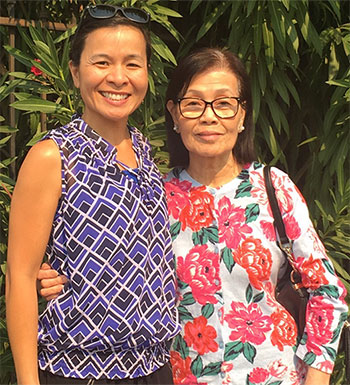Attacking cultural trauma and dementia among Vietnamese immigrants
A personal mission for UC Davis researcher Oanh Meyer
 Oanh Meyer’s mother Anh Le, arrived in the United States in 1975 as a Vietnam War refugee just a few days before the fall of Saigon. And while she settled in America and raised a family, the trauma of living in war-torn Vietnam throughout the conflict took a toll on her.
Oanh Meyer’s mother Anh Le, arrived in the United States in 1975 as a Vietnam War refugee just a few days before the fall of Saigon. And while she settled in America and raised a family, the trauma of living in war-torn Vietnam throughout the conflict took a toll on her.
Now 81 and suffering from dementia and possibly Alzheimer’s disease, Anh Le is haunted by imagined threats from military soldiers, made worse by a long-held distrust of authority figures.
Cultural trauma, language barriers, and lack of awareness among Vietnamese Americans make coping with dementia extremely difficult for both patients and the family members caring for them. This is why Meyer, an assistant professor in the Department of Neurology at the UC Davis Alzheimer’s Disease Center, devoted herself to finding the best ways to support them.
Meyer’s most recent study, published August 6 in the journal Dementia, explores an intervention she and her colleagues developed to help reduce the stress and enhance the health of people who care for their Vietnamese loved ones suffering from dementia and Alzheimer’s. The intervention includes both culturally sensitive education about dementia and related diseases and how to get appropriate medical care, stress management techniques, as well as strategies to better anticipate and manage the behaviors of loved ones living with dementia.
Meyer stresses that while dementia poses significant challenges in every population, older Vietnamese in the U.S. and their caregivers face significant hurdles, beginning with low socio-economic status, poor health, and lack of English language proficiency.
“Most of them are immigrants who came around the time of the war,” she said. “They are getting to the age where they are developing dementia, and many of them don’t know what it is. They think it’s a normal part of aging. It’s very isolating.”
Added to that is the paranoia that can accompany dementia. “My mother constantly thinks that the government or military are nearby and are watching her. These fears stem from past experiences of living in a war-torn Vietnam, terrified that family members and loved ones would be taken and never come back.”
Difficult behaviors and beliefs among those with dementia can lead even their loved ones to conclude that the person is crazy. As a result, caregivers may feel overwhelming stress and uncertain what to do.
The intervention, the first of its kind for this population, is a six-week program of weekly, two-hour sessions. Unlike typical dementia caregiver interventions, these involve several caregivers since the Vietnamese tend to share caregiving responsibilities among family members. The program also incorporates breathing techniques – a good practice in reducing stress among caregivers and patients with dementia.
Meyer recently completed a pilot study using the intervention with eight caregivers at ACC Senior Services off Greenhaven in South Sacramento. Participants reported that the approach was highly effective.
Partnering with ACC and Asian Resources, Inc. Meyer hopes to continue engaging the Vietnamese community in research and eventually extend the intervention with Vietnamese caregivers in counties throughout California.

